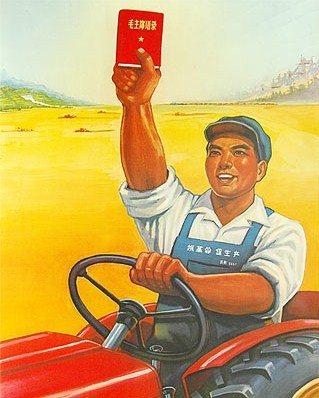Spadina Literary Review — edition 5 page 18
.../
For the peasants, there was no way out. They were bound to the land as rigidly as feudal serfs. To leave your village, you needed permission from a headman. Some people fled anyway, but if they wanted to eat they would have to manage without a ration card. If caught, they were beaten and sent back to their starting point for more beating.
As grain supplies dwindled in Xinyang, most communal kitchens shut down by October of 1959. The greatest number of deaths occurred in the months immediately after. People ate leaves and bark from the trees. They ate bird droppings, cotton batting, clay. They ate corpses. There were thousands of cases of cannibalism, especially of children.
Death by starvation was the final torture. Victims swelled with edema, then wasted away until they died. In some places the bodies lay where they fell alongside the roads. Whole families, entire villages, were wiped out.

Classic Mao-era propaganda poster
The policies that caused starvation continued for three years, altho some production teams, facing sure starvation, dropped communism and allowed peasants to raise their own food again.
Eventually there was no possibility of covering up the many fatalities. True statistics began to leak out and the Central Committee began to recognize that its policies had gone horribly wrong. China started importing grain to compensate for its own shortfalls and began restoring private fields, now officially called “responsibility fields.” Mao gave this a grudging nod, altho he is said to have demanded bitterly, “Have we arrived at socialism or at capitalism?”
Why was there no revolt against the Communist regime during the Great Famine?
To be sure, the countryside was not perfectly quiet. There were some disturbances and riots, even banditry. Gansu Province, for example, reported a steady escalation in the size and brazenness of robberies. What began as individuals committing petty theft by night became by January 1961 some five or six hundred people looting a grain train at Wuwei station in broad daylight.
However, that’s not the same as organized opposition which is what I am talking about here.